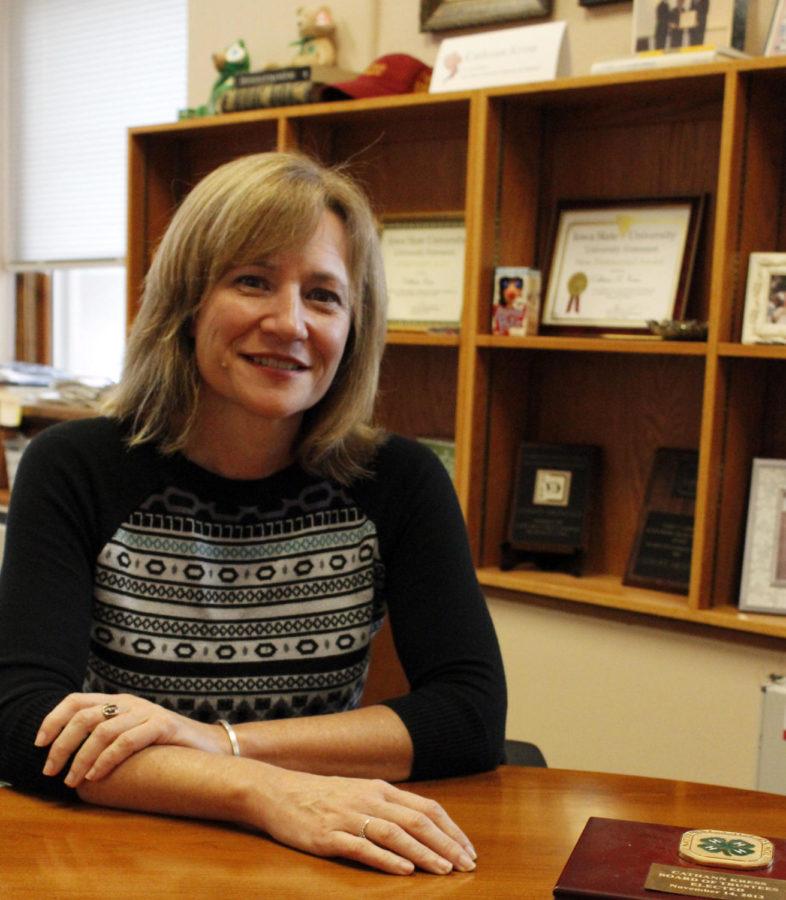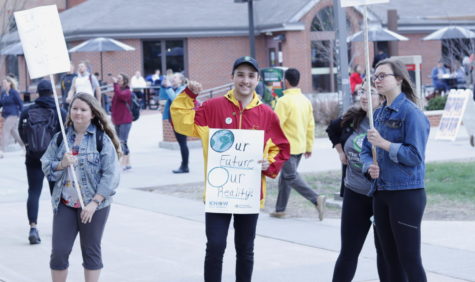Iowa State Extension and Outreach celebrates 100 years of education, programs
Caitlin Ellingson/Iowa State Daily
Cathann Kress is the vice president for extension and outreach. She works for Iowa State to promote the land-grant goals of teaching, research and service for the public good, which includes many outreach programs that educate and get the local community and state involved. “It’s an area of the university where ideas still really flourish,” Kress said.
October 28, 2014
The state of Iowa and Iowa State have a history of being first.
The Iowa legislature was the first state to accept the terms of the Morrill Act in 1862, making practical education available in the state through its land-grant university.
Iowa Agricultural College, the university’s original name, started when farmers from Sioux County approached Professor P.G. Holden to help them with their seed corn germination rate, initiating Iowa State’s connection to the Iowa community with Extension and Outreach.
The Smith-Lever Act, passed 100 years ago, was legislation that created federal, formalized cooperative extension programs.
“[Iowa State] kind of did a number of things first,” said Cathann Kress, vice president for Extension and Outreach.
The department was the third portion of the land-grant school system along with teaching and research. The extension leg became a part of Iowa Agricultural College in 1903 and is now the second largest program at Iowa State, behind the College of Liberal Arts and Sciences, Kress said.
The mission of Extension and Outreach is simply to pass on knowledge from the land-grant college to people of the state who could utilize its breakthroughs.
Kress described early Extension and Outreach as being an expert-driven model. With no Internet to look up answers to agriculture, family sciences and health questions, people turned to the department for answers.
“We kind of were the Google,” Kress said.
Lyn Brodersen, assistant vice president for Extension and Outreach, said that those founding subjects have now grown to include every college at Iowa State.
“We have broadened significantly, and that’s unusual nationwide,” Brodersen said.
Kress echoed this by saying Iowa State’s name for the department shows its broad portfolio.
The original term, Cooperative Extension, related to agriculture, home economics and 4-H programs. By using the term Extension and Outreach, Iowa State reflects the influence of other disciplines, including design and engineering.
“Even 4-H reflects this shift,” Kress said, pointing out programs in robotics and nanotechnology for Iowa’s youth.
In the next 100 years, Extension and Outreach may look more toward three main points that likely were not considered in 1914.
“That’s one we’ve been asking ourselves a lot,” Kress said about looking 100 years down the road.
The points of interest are demographic trends leading to older, urban and multicultural communities; technology including smartphones, biorenewables and manufacturing; and globalization as it relates to local economies.
By having a broad scope in Iowa, nearly one million people directly benefit from the department’s educational programs, according to the department’s annual report in 2013.
Brodersen said students can get involved with Extension and Outreach by applying for internships with the organization and by participating in any programming available. She added that the department can help with a number of questions about landscaping, job opportunities and virtually anything state-wide.
“That’s the beauty of what we do,” Kress said. “We can tailor things very specifically to what you need.”
Kress also pointed out the possibilities that lay with Extension and Outreach.
“I think in Extension and Outreach there are such great opportunities. Everybody can participate and innovate,” Kress said.

















